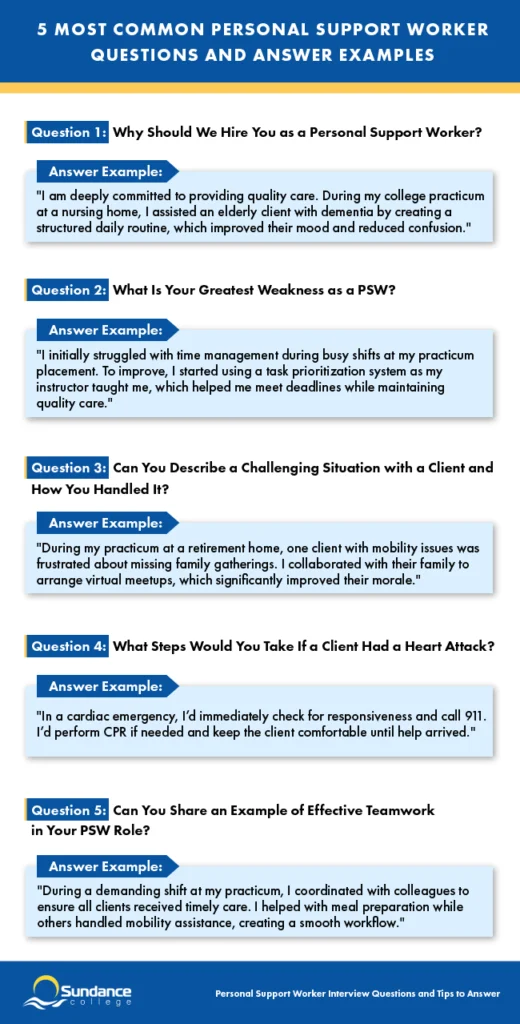Blog / Personal Support Worker Interview Questions and Tips to Answer
Personal Support Worker Interview Questions and Tips to Answer

Personal Support Worker Diploma
- Personal Aide - Home Support
- Family Caregiver
- Personal Support Worker
- Home Support Worker
Table of Contents
“How do I prepare for a PSW interview?”
Securing a position as a personal support worker (PSW) means acing the job interview. Whether you’re brand new to the healthcare field or you’re bringing years of experience to the table, being prepared for this moment could make or break your chances.
The following guide will help you prepare, covering essential preparation tips, typical interview questions for personal support worker candidates, and effective strategies to answer them to make a strong impression on potential employers.
Listen to “Personal Support Worker Interview Questions and Tips to Answer”
Tips to Prepare for the Personal Support Worker Job Interview
1. Research the Organization
Before the interview, learn about the organization. Understand their mission, values, services, and client demographics. This knowledge helps you tailor your answers and demonstrate your genuine interest in the health aide role.
- Visit the company’s website and read their “About Us” section
- Look for recent news, reviews, or updates about the organization
- Understand their primary client base, such as elderly care or disability support
2. Understand the Job Requirements
Familiarize yourself with the core responsibilities of a PSW, such as assisting with daily living activities, providing companionship, and handling medical emergencies.
- Think about how your skills align with these duties
- Review the job description thoroughly
- Prepare examples of how you’ve excelled in similar roles
- Highlight relevant certifications like CPR and First Aid
3. Practice Common Interview Questions
Rehearse answers to frequently asked PSW interview questions. Focus on showcasing your exceptional PSW skills including empathy, problem-solving, and teamwork. Use the STAR method (Situation, Task, Action, Result) to structure your responses.
4. Dress Appropriately for a PSW Interview
How to dress for a PSW interview? Make a good impression by dressing clean, simple, and professional. Opt for business casual attire like a shirt, pants, and a cardigan/blazer. Avoid jeans, sneakers, or flashy accessories to convey your seriousness and respect for the role.
Most Common PSW Interview Questions
Personal support worker interviews often focus on your interpersonal skills, emergency response abilities, and commitment to client care. Here is how to handle the key personal support worker job interview questions with confidence:
Question 1: Why Should We Hire You as a Personal Support Worker?
Purpose: To gauge your PSW skills, experience, and passion for caregiving.
How to Answer:
- Highlight key attributes like empathy, patience, and reliability.
- Discuss any specialized training, such as dementia care or elderly support.
- Share specific examples of your client-centric care from your college practicum experience or previous healthcare-related roles if any.
Example:
“I am deeply committed to providing quality care. During my college practicum at a nursing home, I assisted an elderly client with dementia by creating a structured daily routine, which improved their mood and reduced confusion.”
Question 2: What Is Your Weakness as a Support Worker?
Purpose: To evaluate self-awareness and your ability to improve.
How to Answer:
- Be honest but positive.
- Share a minor weakness and the steps you’ve taken to overcome it.
- Emphasize how you’ve grown professionally.
Example:
“I initially struggled with time management during busy shifts at my practicum placement. To improve, I started using a task prioritization system as my instructor taught me. It helped me meet deadlines while maintaining quality care.”
Question 3: Can You Describe a Challenging Situation with a Client and How You Handled It?
Purpose: To assess your problem-solving and interpersonal skills.
How to Answer:
- Choose a specific example.
- Briefly describe the challenge, your response, and the positive outcome.
- Highlight your calm demeanor and communication skills.
Example:
“During my practicum at a retirement home, one client with mobility issues was frustrated about missing family gatherings. I collaborated with their family to arrange virtual meetups, which significantly improved their morale.”
Question 4: What Steps Would You Take If a Patient Had a Heart Attack?
Purpose: To test your emergency response capabilities.
How to Answer:
- Explain the steps clearly: assess responsiveness, call 911, perform CPR as trained in your program, and inform your supervisor.
- Mention your certifications and emphasize staying calm under pressure.
Example:
“In a cardiac emergency, I’d immediately check for responsiveness and call 911. I’d perform CPR if needed and keep the client comfortable until help arrived.”
Question 5: Can You Share an Example of Effective Teamwork in Your PSW Role?
Purpose: To evaluate your collaboration and communication skills.
How to Answer:
- Provide a real example of working with a team to deliver exceptional care.
- Focus on your role, contributions, and the positive results achieved.
Example:
“During one demanding shift at my practicum, I coordinated with colleagues to make sure all clients received timely care. I helped with meal preparation while others handled mobility assistance, creating a good workflow.”

What Questions to Ask at the End of the Interview?
To complement your preparation for common PSW interview questions and answers, here are some thoughtful questions to ask the employer:
- What support or training do new hires receive?
- How do you measure success in this role?
- What does a typical day look like for a PSW here?
- Are there opportunities for career advancement?
These questions demonstrate your enthusiasm for the position and help you gain a deeper understanding of what to expect.
Common Mistakes to Avoid During a PSW Interview
Avoid these common pitfalls to make a strong impression during your interview:
- Not Researching the Organization:
Why It’s a Mistake: It shows a lack of preparation and interest.
What to Do Instead: Familiarize yourself with the company’s mission, services, and client demographics.
- Providing Generic Responses:
Why It’s a Mistake: Vague answers don’t demonstrate your skills effectively.
What to Do Instead: Use specific examples to connect your client care expertise to the specific skills and knowledge you’ll bring to the role.
- Overlooking Key Details Like Schedule and Pay
Why It’s a Mistake: Uncertainty about hours or salary may lead to dissatisfaction later.
What to Do Instead: Politely inquire about work hours, shift flexibility, and pay structure during the interview.
- Failing to Ask Questions:
Why It’s a Mistake: It can make you appear disinterested or unengaged.
What to Do Instead: Ask thoughtful questions about daily routines, KPIs, team dynamics, and growth opportunities.
By addressing these areas, you’ll be better prepared to impress employers and secure one of the personal support worker career paths.
What to Do After Your PSW Interview: Bonus Tip
Sending a thank-you email within 24 hours shows your appreciation, reiterates your interest in a PSW position, and leaves a lasting positive impression on the interviewer.
Boost Your PSW Interview Skills with Professional Training
To be well-prepared for the PSW interview questions and answers and a successful career in this field, consider professional training. For example, Sundance College’s Personal Support Worker diploma provides the knowledge, hands-on experience, and confidence needed to succeed – including lifelong access to our career services!
You can apply here.
Related Blogs
Subscribe for more career advice
Blog Categories
Share on:
